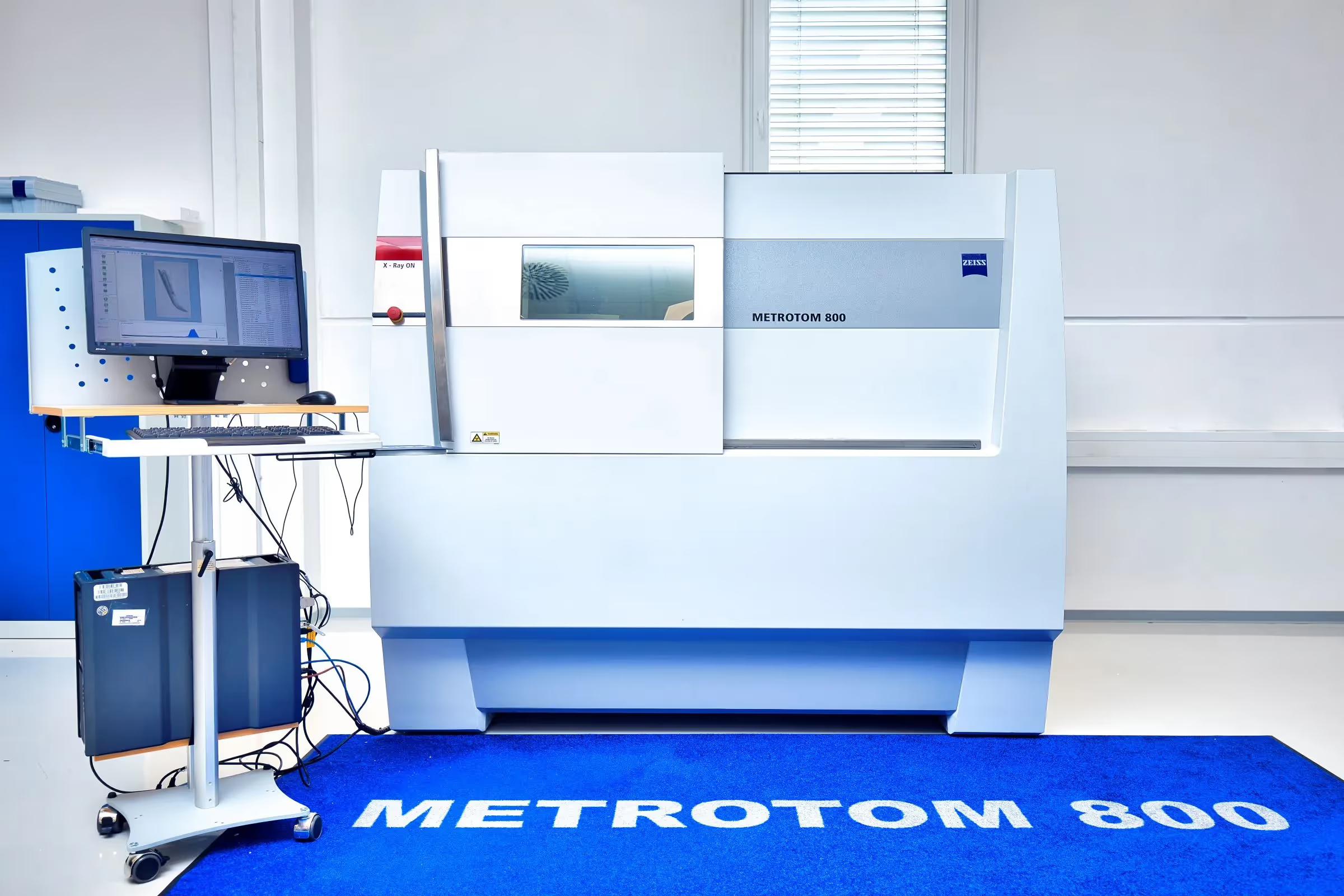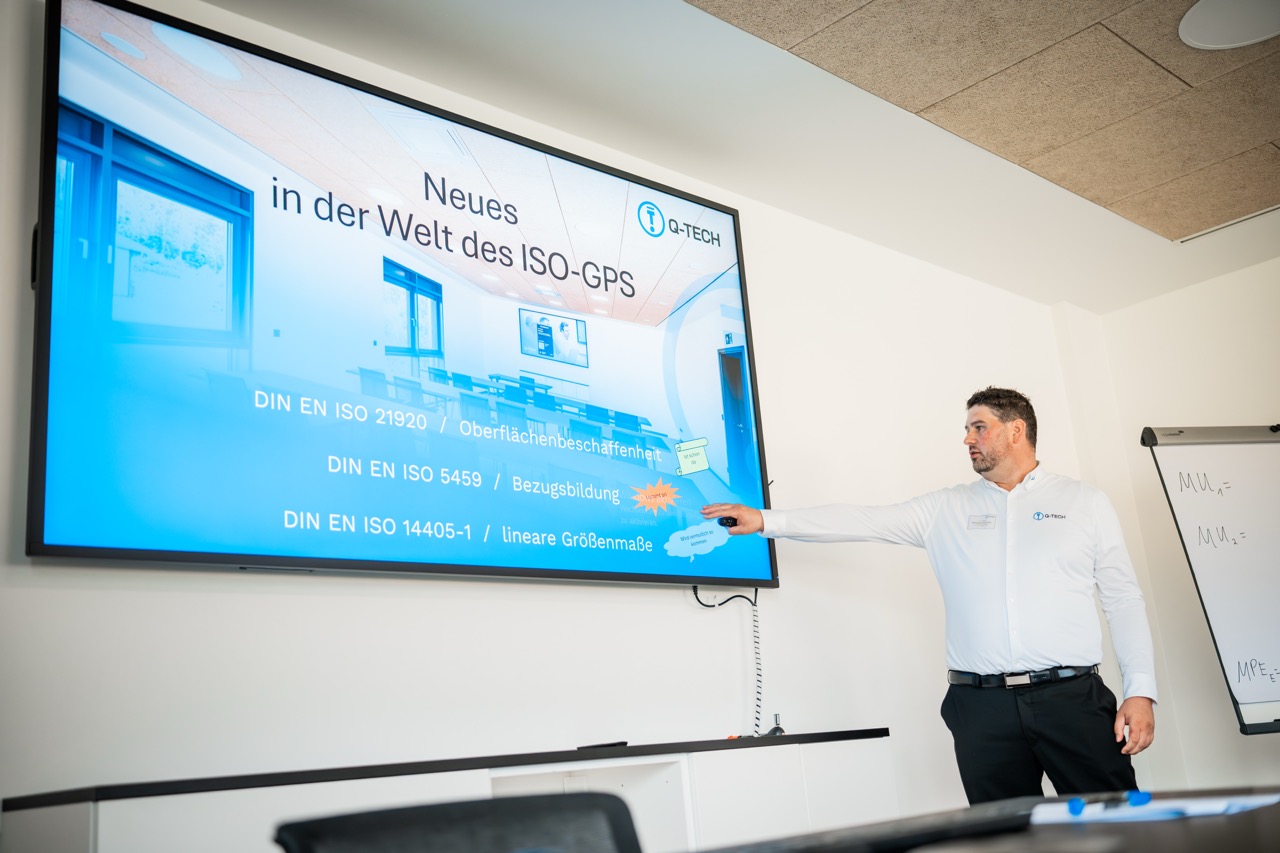Genaue Messverfahren sind in der Industrie essenziell. Mittlerweile gibt es eine Vielzahl an unterschiedlichen Methoden, um physikalische Größen zu messen. Präzise Messungen sind in der Industrie unabdingbar für die Qualitätssicherung und die Überprüfung der Funktionalität technischer Bauteile. Ohne die Prüfung könnten keine wichtigen Rückschlüsse für die Fertigung gezogen werden.
Warum nimmt die industrielle Messtechnik eine so wichtige Rolle ein? Die industrielle Messtechnik trägt dazu bei, die Qualität der Produktionsabläufe zu sichern, zu optimieren und zu überwachen. Dabei können physikalische Größen wie Länge, Temperatur oder elektrische Spannungen gemessen werden. Fehlerhafte Messungen führen häufig zu Fehlern, die hohe Kosten verursachen und das Unternehmen wirtschaftlich schwächen.
Wir bei Q-Tech nutzen eine Vielzahl der Verfahren aus der industriellen Messtechnik. Die entscheidende physikalische Größe, auf die wir unseren Fokus legen, ist die Länge bzw. die Längenmesstechnik. Wenn Sie mehr zu den einzelnen Messtechnologien wissen wollen, die wir als Dienstleistung anbieten, dann lesen Sie diesen Artikel.
Die heutige Grundbedeutung der industriellen Messtechnik
Während die Messtechnik ein sehr weitläufiger Begriff ist und viele Verfahren und Methoden umfasst, geht es in der industriellen Messtechnik rein um die Anwendung von Messtechniken und Messverfahren in industriellen Prozessen bzw. im industriellen Umfeld.
Eine wichtige Größe in der Industrie ist die Länge eines Bauteils. Liegt diese nicht innerhalb der technisch geforderten Toleranz, gilt das Bauteil als fehlerhaft. In einigen Fällen weigern sich Kunden, bestimmte Lieferungen dann nicht zu bezahlen. Ohne eine präzise Messtechnik würde also nicht nur die Qualität, sondern auch die Geschäftsbeziehungen Schaden nehmen.
Anforderungen an die industrielle Messtechnik
Während es früher darum ging, hauptsächlich mehr Stückzahlen pro Zeiteinheit herzustellen, kommt es heute mehr und mehr darauf an, qualitativer zu produzieren.
Die industrielle Messtechnik soll also die Produktion unterstützen. Anhand der gemessenen Daten kann der Herstellungsprozess korrigiert werden, damit kein Ausschuss produziert wird.
Aufgrund der heutigen technologischen Standards sieht sich die industrielle Messtechnik mit neuen Herausforderungen konfrontiert. Infolgedessen nimmt die Variabilität der Messtechnologien zu. Dies führt zu einer größeren wirtschaftlichen Flexibilität bei Unternehmen.
Eine qualitativ hochwertige industrielle Messtechnik liefert somit schnelle, objektive und verwertbare Ergebnisse für den industriellen Prozess.

Die häufigsten Werkzeuge
Sie können die genutzten Messwerkzeuge in vier Hauptkategorien unterscheiden:
- Manuelle Messgeräte
- Halbautomatische Messsysteme
- Automatische Prüfwerkzeuge
- Kontrolltische
Die Wahl der Messwerkzeuge hängt nun stark von der jeweiligen Situation ab.
Der Prüfer muss viele Elemente, wie die Genauigkeit, die Geschwindigkeit oder die Benutzerfreundlichkeit berücksichtigen und anhand dieser Faktoren, die richtigen Messgeräte auswählen.
Ein gutes industrielles Messwerkzeug zeichnet sich durch einen automatischen, flexiblen und schnellen Umgang aus.
Dennoch lässt sich nicht allgemein sagen, welches per se das “beste” oder das “genaueste” Messgerät ist. In vielen Fällen ist sogar die Benutzerfreundlichkeit und die Handhabung der Einrichtung weitaus wichtiger als die Genauigkeit des Geräts.
Tactile measurement technology
Die taktile Messtechnik kommt bei der schnellen und präzisen Überprüfung von Prototypen und Serienbauteilen zum Einsatz. Das können z. B. Qualitätskontrollen in der Automobilindustrie, im Maschinen- oder Werkzeugbau sein. Aber auch in der Feinmechanik, Medizintechnik oder der Kunststofftechnik werden taktile Verfahren genutzt.
Charakteristisch für die taktile Messtechnik sind stichprobenartige oder 100-prozentige Qualitätskontrollen in den oben genannten Einsatzgebieten.
In großen Serien kann diese Technik ebenfalls gute Ergebnisse liefern, wenn zum Beispiel nur wenige Prüfmerkmale untersucht werden müssen.
Während des Verfahrens scannt die Maschine die Oberfläche des Bauteils mittels eigener Sensoren. So kann neben klassischer dimensioneller Messtechnik unter anderem auch die Rauheit des Bauteilmaterials erfasst werden. Diese Methode eignet sich insbesondere bei Werkstücken mit sehr kleinen Toleranzen.
Optical measurement technology
Die optische Messtechnik ist ideal für die schnelle Erfassung und 3D Digitalisierung von Außengeometrie und einer vollständigen Bauteilanalyse beliebig großer Werkstücke.
Da die moderne Industrie immer nach einer höheren Produktionsgeschwindigkeit strebt, nimmt die optische Messtechnik an Relevanz zu. Das liegt unter anderem daran, dass die gesamte Bauteilgeometrie in Sekundenschnelle digitalisiert werden kann. Das geschieht komplett berührungslos, mit einem 3D Scanner..
Im Anschluss entsteht ein 3D Abbild, in dem die Abweichungen grafisch visualisiert, zu sehen sind. Mit diesem Soll-Ist Abgleich des Oberflächenprofils erkennt der Prüfer schnell alle Abweichungen. Mit den gewonnen 3D-Daten lassen sich auch Abweichungen bei Form- und Lagetoleranzen, Flächenrückführungen oder Erstbemusterungen durchführen.
3D-Computertomografie
Mittels der 3D-Computertomografie können Sie in das Innere eines Bauteils blicken, ohne dieses zu beschädigen. So lassen sich schnell poröse Stellen, Risse und Defekte erkennen.
Eine 3D-Computertomografie eignet sich besonders für die Bereiche, in denen eine optische oder taktile Messung nicht möglich ist.
Das Verfahren lässt sich auf Kunststoffe, Leichtmetalle oder Elektrokomponenten anwenden.
Die Methode eröffnet verschiedene Analysemöglichkeiten wie Vermessungen, Soll-Ist-Vergleiche, Defektanalysen, Formanalysen, Volumenanalysen und Größenanalysen.
Eng verwandt mit der 3D-Computertomografie ist die 2D-Röntgeninspektion. Hier erfolgt die Analyse anhand hochauflösender Röntgenaufnahmen, bei denen selbst Details im Nanometerbereich für den Prüfer erkennbar sind. Ist hingegen ein digitaler Abdruck eines Prüfteils oder eine Volumenmessung gewünscht, kommt wieder die 3D-Computertomografie zum Einsatz.

Mess- und Prüfverfahren je nach Einsatzgebiet
Im Folgenden erfahren Sie mehr über die einzelnen Einsatzgebiete der industriellen Messtechnik.
Automotive industry
Die Automobilindustrie sieht sich mit kurzen Entwicklungszeiten und neuen Technologien konfrontiert. In Zukunft liegt der Fokus mehr und mehr auf Batterien, Elektromotoren, Leistungselektronik und Brennstoffzellen.
In der Automobilindustrie kommen taktile und optische Messungen zum Einsatz. Aber auch die Computertomografie findet hier Anwendung. Häufig werden auch einzelne Mess- und Prüftechniken miteinander kombiniert, um noch präzisere Ergebnisse zu liefern.
Kunststoffindustrie
In der Kunststoffindustrie müssen die polymeren Werkstoffe unter anderem darauf geprüft werden, ob sie den geplanten Belastungen standhalten. Zu den Kunststoffen zählen Thermoplaste, Duroplaste, Elastomere, Schaumstoffe und Verbundwerkstoffe.
Hier eine Liste mit den Punkten, die während des Prüfens näher untersucht werden:
- Porosität
- Einschlüsse
- Geometrische Formabweichungen aufgrund von Verzug bzw. Schrumpfung
- Thermische Eigenschaften
- Materialzusammensetzung
- Faserausrichtung
- Volumenanteile
Medical technology
Aufgrund des gesundheitlichen Hintergrunds unterliegen Medizin und Pharmaprodukte strengen Qualitätsanforderungen. Wenn Sie sich also dazu entschließen, ein fähiges Medizinprodukt herzustellen, müssen Sie Rechtsvorschriften und Normen einhalten.
Geprüft werden unter anderem: Implantate, ärztliche Instrumente, pharmazeutische Produkte, Ampullen, Spritzen und Fläschchen.
Fazit: Präzise Messungen erhalten den Qualitätsstandard in der Industrie
Präzise Messung ist in der Industrie unverzichtbar. Insbesondere, weil die Qualität gesichert und der gesamte Industrieprozess optimiert wird. Dadurch kommt es zu einer Steigerung der Wirtschaftlichkeit und einer Kosteneinsparung.
Die industrielle Messtechnik nutzt je nach Messverfahren bestimmte Geräte und Messverfahren, um das präziseste Ergebnis zu liefern.





.svg)


.avif)
.svg)

%20(1).webp)
.svg)
.svg)
%20(1).webp)

.svg)
.svg)
.svg)
.svg)


.svg)
.svg)
